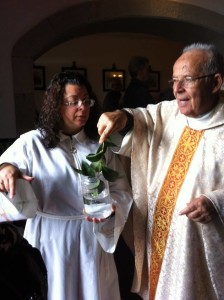VISITS OF THE HOLY SPIRIT – Traditional Devotion in Madeira
There is a Catholic tradition in Madeira that takes place every year within the parishes of Funchal. It is a very old tradition of devotion to the Holy Spirit and is called “Visitas do Espirito Santo” (loosely translated as Visits of the Holy Spirit).
Every Sunday during the Paschal Time (this year starting on April 23rd) and until Pentecost Sunday (June 4th) a group of people usually composed of three men from the church and two girls called “saloias” (country girls) will visit the houses of the parish community along the streets in the different suburbs of Funchal.
These visits take place during specific times which are decided upon by the Diocese, and the community is informed in advance so that they can prepare for these special visits. The aim of these “Holy Spirit” visits is to bring each family “the joy of the Risen Christ” and also to collect funds that have several purposes such as helping the poor, or restoration work in the church, amongst other things.
The 3 men in the group will usually wear special red cloaks, while the young girls who accompany the group are dressed in red or in the typical regional dress. In some parishes the girls are ornamented with gold, and on arrival at the houses they visit, they will sing traditional songs. The lyrics and music will vary depending on which region they are from. These “Espirito Santo” (Holy Spirit) groups also visit the churches around the island. The girls will carry baskets with flowers which also serve to collect the sweets and other goodies that are offered to them. There are some places where the group is accompanied by people playing musical instruments.
![18424065_1882018075412403_6283013798079143202_n[1]](http://rcmassmadeira.org/wp-content/uploads/2017/05/18424065_1882018075412403_6283013798079143202_n1-169x300.jpg)
